Posted on
June 06, 2015 by
Dean Hybl
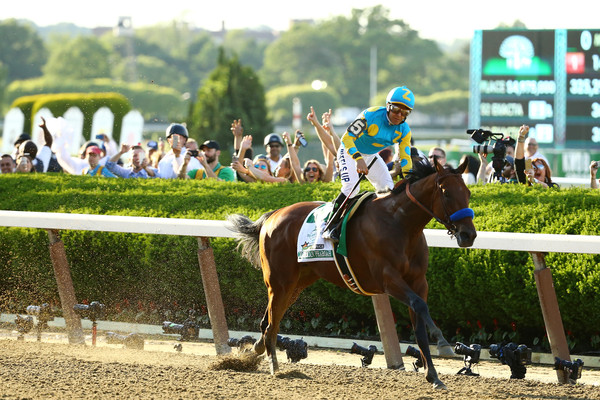
American Pharoah is the first horse racing Triple Crown winner in 37 years.
After 37 years and many close calls, it might have been fair to believe that horse racing in the 21st Century was not destined for a Triple Crown winner. However, that was before American Pharoah did what 13 previous horses could not since Affirmed in 1978 and added victory at the Belmont Stakes to wins at the Kentucky Derby and Preakness.
With his wire-to-wire victory, American Pharoah is now the 12th member of an impressive club that began with Sir Barton in 1919 and also includes well known horses including Secretariat, Affirmed, Citation, Whirlaway and War Admiral.
While much has been made of the 37 year drought, perhaps the real number to indicate just how challenging it is to win the Triple Crown is that American Pharoah is just the fourth winner in the last 67 years. In fact, if you set aside the anomaly between 1973 and 1978 when there were three Triple Crown winners in a six year stretch, American Pharoah accomplished what 20 horses had not been able to complete since Citation in 1948.
That both jockey Victor Espinoza (twice) and trainer Bob Baffert (three times) had been in this position previously gave both of them an interesting perspective and understanding of the pressure and extra demands surrounding a run for the Triple Crown.
Of course, the different component of the equation in 2015 was the horse and American Pharoah proved that he was up to the challenge. That he headed right to the front and then stayed there throughout, actually growing his lead over the final quarter mile, illustrated that he was indeed a champion worthy of immortality. Read the rest of this entry →
Tags: American Pharoahbelmont stakesHorse RacingTriple Crown
Category
Horse Racing
Posted on
April 20, 2015 by
Andre Smith
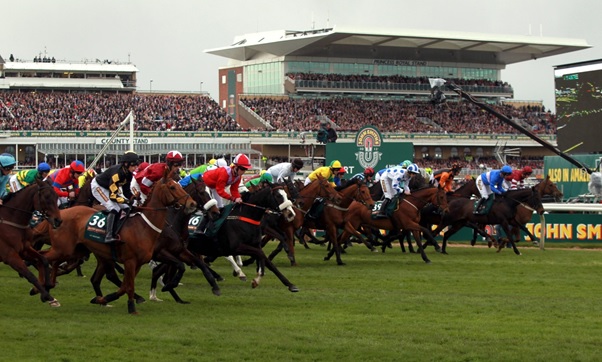 After another fiercely battled rush to the winning post, and mercifully with no horses being harmed in the making of the epic Aintree race, the 2015 Grand National once more bought a host of surprises from its field of talented runners and racers. The race itself was won by the Irish-bred, British-trained Many Clouds, owned by Trevor Hemmings and trained by National Hunt racing trainer Oliver Sherwood.
After another fiercely battled rush to the winning post, and mercifully with no horses being harmed in the making of the epic Aintree race, the 2015 Grand National once more bought a host of surprises from its field of talented runners and racers. The race itself was won by the Irish-bred, British-trained Many Clouds, owned by Trevor Hemmings and trained by National Hunt racing trainer Oliver Sherwood.
Many Clouds himself has been enjoying plenty of attention since his win at the 2015 Crabbie’s Grand National earlier this month. The winning racehorse who clinched the victory ahead of Saint Are, Monbeg Dude, Alvarado and race favorite Shutthefrontdoor was paraded through the streets of Lambourn the day after the big race to a huge turnout of supporters. The win marked Irish jockey Leighton Aspell’s second Grand National title who has now clinched back-to-back triumphs at both the 2014 and 2015 National’s.
Even though Many Clouds was feeling the heat after the race and needed some time out to cool down and relax again, the thoroughbred was fine and thankfully came through the race unharmed, as did all the horses that competed in the tough and often brutal race held at Aintree in Liverpool. Read the rest of this entry →
Tags: 2015 Grand National
Category
Horse Racing
Posted on
April 08, 2015 by
John Harris
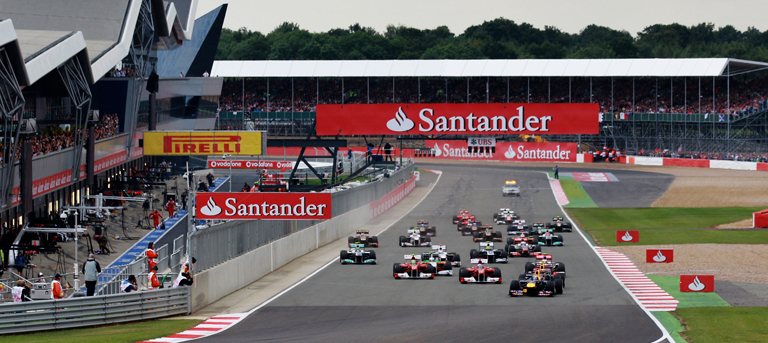
The British Grand Prix is always one of the sporting highlights of the year in the UK.
Even if you are a casual observer, you will likely have noticed the passion and fervor associated with sporting events held annually in the UK, and how they keep drawing in the crowds year after year. Here are some of the highest profile sporting events.
The FA Cup Final
Held in May of each year, the FA Cup Final marks the end of the football season and the culmination of one of the most famous knockout competitions in world football. The Cup Final, held at Wembley Stadium, is a glamorous affair and receives extensive media coverage both at home and internationally, but the competition starts in August of each year and goes through six qualifying rounds before the League clubs enter the draw. The FA Cup has become famous for its so-called giant killings, with unfancied teams beating their more high-profile opponents. If you are a football fan, you will likely remember some of these matches, including Cup Finals such as 1973, when Sunderland beat Leeds United, and 1988, when Wimbledon shocked Liverpool, the then-giant of English football.
The British Grand Prix
The UK has a long association with motor car racing, and Formula One comes to the country annually with a Grand Prix, currently held at the Silverstone Circuit. Grand Prix motor racing in the UK can be traced back to the 1920s, and the history of the British Grand Prix shows some thrilling races down through the years. Such homegrown talents as Stirling Moss, Nigel Mansell and, more recently, Lewis Hamilton have enjoyed wins in the race. Hamilton won the 2014 race on his way to that year’s World Championship and will hope for a repeat in July. Read the rest of this entry →
Tags: British Grand PrixFA Cup FinalThe Grand National
Category
Auto Racing, Formula One, Horse Racing, soccer
Posted on
April 03, 2015 by
Ashley Andrews
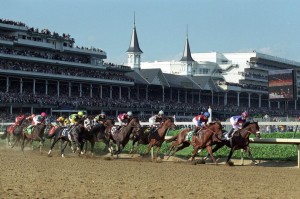
Churchill Downs is the most famous horse track in America.
Churchill Downs in Louisville, Kentucky is one of the most recognizable track names in the U.S. Opening in 1875, this über famous racetrack has been the home of the Kentucky Derby and Oats ever since the race’s founding, and many other races throughout history. The closing of two earlier tracks in Kentucky paved the way for Churchill Downs to replace them in a major way. As one of the most popular sports at the time, Kentucky needed a horse racing track, and a man named Meriwether Lewis Clark Jr. delivered. The track is actually named after the men who leased the land to Clark, John and Henry Churchill.
By 1902, Churchill Downs came under the control of a man named Matt Winn, who turned the track into a prestigious display of thoroughbred racing, steering away from its late-1800s reputation of being a gambling site. Being a 1 ¼ mile track, Winn and his business partners decided to use the track for more than just horses. They built a clubhouse, and began using the facility for things like auto racing and concerts. The reputation, sophistication, and discernment of Churchill Downs came to full realization when it was officially staked as a National Historic Landmark in 1986.
Today, the track is still home of the most famous horse races in North America, and continues to expand its capabilities and pliability by introducing events like night horse races, concert tours, and state fairs. The track has reached a total size of 147 acres, far exceeding its original size of 80 acres. This allows for the 150,000 attendants of the Derbies, especially the Kentucky Derby, and the sizable crowds that come for the 360° cinema. Read the rest of this entry →
Tags: Churchill DownsHorse Racing
Category
Horse Racing
Posted on
August 18, 2014 by
Eva Thompson
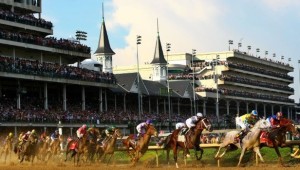
The horse racing industry in the United States brings in over $26 billion each year.
Horse racing provides a full spectrum of entertainment unlike any other sport. Whether your horse wins or loses, spending a day at the races makes for a great afternoon or evening outdoors watching beautiful animals compete.
The Tradition of Horse Racing
Horse racing has been a long standing tradition among many cultures. The sport dates back all the way to 4500 BC among nomadic tribesmen in Central Asia, who first domesticated horses. Archeological records reveal that the Ancient Greeks, Syrians, Babylonians, and Egyptians also participated in horse racing to entertain the masses and honor outstanding horsemanship required for battles. Later horse racing became popular among British royalty and aristocracy where it received the nickname “Sport of Kings”.
These days, horse racing represents one of the only legal forms of gambling around the world, including Great Britain, Ireland, Canada, the United States, South America, the Middle East, and Australia. Read the rest of this entry →
Tags: AffirmedHorse RacingSeabiscuitSecretariat
Category
Horse Racing, Sports History
Posted on
August 11, 2014 by
Martin Banks
Now that the calendar has turned to August, the eyes of the racing world have turned to the historic Saratoga Race Course in beautiful Saratoga Springs, N.Y. This town is wonderful to visit any time of the year, but it really springs to life during the summer racing meet, when top thoroughbreds converge to compete in top-quality races.
Saratoga has been hosting summer races since 1863, and over the years it has become known as the “graveyard of champions.” This refers to the fact that many times, horses that seemed invincible went down in stunning defeat. Although races like these can lead to huge payoffs for bettors, it comes at great expense to champion horses. Two of these horses share that history and also the nickname of Big Red. They were Man ‘o War and Secretariat.
Man o’ War Melts
![1 R UMAX Mirage IIse V1.1 [4]](http://sportsthenandnow.com/wp/wp-content/uploads/2014/08/manowar-300x240.jpg)
Man o’ War was a stunning chestnut colt who raced in the years 1919 and 1920. When he competed in the Sanford Stakes for 2-year-olds on Aug. 13, 1919, his reputation was already such that he seemed a lock to win. His previous six victories were so impressive that it seemed it was impossible for him to lose. In fact, this was the only race that he ever would lose in his entire racing career.
Starting gates were not used at this time, and starters had to make sure horses were properly lined up behind a tape barrier and ready to race. Unfortunately for Man o’ War, the tape was sprung when he was apparently backing up. Essentially, he was left at the start. Read the rest of this entry →
Tags: Horse RacingMan O' WarSaratogaSecretariat
Category
Horse Racing, Scott Huntington





![1 R UMAX Mirage IIse V1.1 [4]](http://sportsthenandnow.com/wp/wp-content/uploads/2014/08/manowar-300x240.jpg)